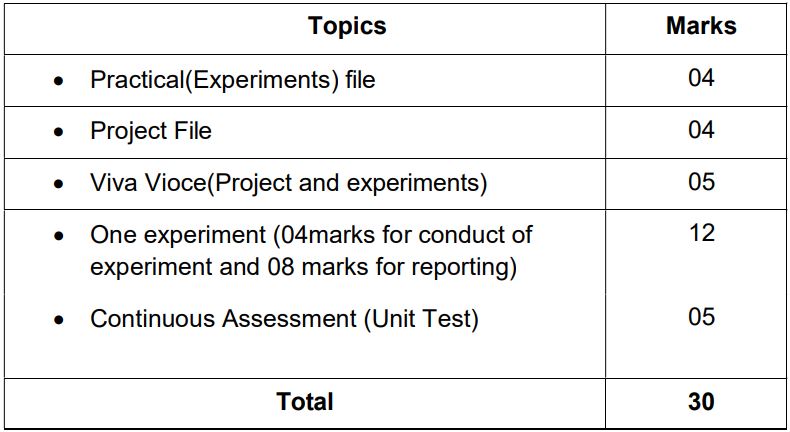UK Board Class 11 Psychology Syllabus 2023-24: The Class 11 Psychology syllabus by Uttarakhand Board of School Education (UBSE) helps students understand the nature of psychological knowledge and its application to various aspects of life. The syllabus has been designed to provide students with a foundation in the basic concepts of Psychology and help them become perceptive, socially aware, and self-reflective. The syllabus is divided into eight units. The details of topics to be covered in each unit are clearly mentioned in the latest syllabus. You will be able to check the complete syllabus of UBSE Class 11 Psychology here. You will get to know the course content along with the marking scheme for the theory paper as well as for internal assessment. You can also download the syllabus in PDF from the direct link provided in this article.
Uttarakhand Board Class 11 Psychology Course Structure
Assessment Scheme for Uttarakhand Board Class 11 Psychology will be as follows:
| Theory Paper | 70 marks |
| Internal Assessment/Practical | 30 Marks |
| Total | 100 Marks |
The Uttarakhand Board Class 11 Psychology Question Paper 2024 will be for 70 marks and the exam duration will be of 3 hours.
Also Check: Uttarakhand Board Class 11 Syllabus 2023-24 All Subjects
Uttarakhand Board Class 11 Psychology (Code - 122) Syllabus 2023-24
| Units | Topics | Marks |
| I | What is Psychology? | 11 |
| II | Methods of Enquiry in Psychology | 13 |
| IV | Human Development | 11 |
| V | Sensory, Attentional and Perceptual Processes | 08 |
| VI | Learning | 09 |
| VII | Human Memory | 08 |
| VIII | Thinking | 05 |
| IX | Motivation and Emotion | 05 |
|
| Total | 70 |
UBSE Class 11 Psychology Course Content
Unit I What is Psychology?
The topics in this unit are:
1.Introduction
2.What is Psychology?
- Psychology as a Discipline
- Psychology as a Natural Science
- Psychology as a Social Science
3.Understanding Mind and Behaviour
4.Popular Notions about the Discipline of Psychology
5.Evolution of Psychology
6.Development of Psychology in India
7.Branches of Psychology
8.Psychology and Other Disciplines
9.Psychology in Everyday Life
Unit II Methods of Enquiry in Psychology
The topics in this unit are:
1.Introduction
2.Goals of Psychological Enquiry
- Steps in Conducting Scientific Research
- Alternative Paradigms of Research
3.Nature of Psychological Data
4.Some Important Methods in Psychology
- Observational Method
- Experimental Method
- Correlational Research
- Survey Research
- Psychological Testing
- Case Study
5.Analysis of Data
- Quantitative Method
- Qualitative Method
6.Limitations of Psychological Enquiry
7.Ethical Issues
Unit IV Human Development
The topics in this unit are:
1.Introduction
2.Meaning of Development
- Life-Span Perspective on Development
3.Factors Influencing Development
4.Context of Development
5.Overview of Developmental Stages
- Prenatal Stage
- Infancy
- Childhood
- Challenges of Adolescence
- Adulthood and Old Age
Unit V Sensory, Attentional and Perceptual Processes
The topics in this unit are:
1.Introduction
2.Knowing the world
3.Nature and varieties of Stimulus
4.Sense Modalities
- Childhood
- Challenges of Adolescence
- Adulthood and Old Age
Unit V Sensory, Attentional and Perceptual Processes
The topics in this unit are:
1.Introduction
2.Knowing the world
3.Nature and varieties of Stimulus
4.Sense Modalities
- Functional limitation of sense organs
5.Attentional Processes
- Selective Attention
- Sustained Attention
6.Perceptual Processes
Unit VI Learning
The topics in this unit are:
1.Introduction
2.Nature of Learning
3.Paradigms of Learning
4.Classical Conditioning
- Determinants of Classical Conditioning
5.Operant/Instrumental Conditioning
- Determinants of Operant Conditioning
- Key Learning Processes
6.Observational Learning
7.Cognitive Learning
8.Verbal Learning
9.Skill Learning
10.Factors Facilitating Learning
11.Learning Disabilities
Unit VII Human Memory
The topics in this unit are:
1.Introduction
2.Nature of memory
3.Information Processing Approach : The Stage Model
4.Memory Systems : Sensory, Short-term and Long-term Memories
5.Levels of Processing
6.Types of Long-term Memory
- Declarative and Procedural; Episodic and
- Semantic
7.Nature and Causes of Forgetting
- Forgetting due to Trace Decay, Interference and
- Retrieval Failure
8.Enhancing Memory
- Mnemonics using Images and Organisation
Unit VIII Thinking
The topics in this unit are:
1.Introduction
2.Nature of Thinking
- Building Blocks of Thought
3.The Processes of Thinking
4.Problem Solving
5.Reasoning
6.Decision-making
7.Nature and Process of Creative Thinking
- Nature of Creative Thinking
- Process of Creative Thinking
8.Thought and Language
9.Development of Language and Language Use
Unit IX Motivation and Emotion
The topics in this unit are:
1.Introduction
2.Nature of Motivation
3.Types of Motives
- Biological Motives
- Psychosocial Motives
4.Maslow’s Hierarchy of Needs
5.Nature of Emotions
6.Expression of Emotions
- Culture and Emotional Expression
- Culture and Emotional Labelling
7.Managing Negative Emotions
8.Enhancing Positive Emotions
Practical (Projects, experiments, small studies, etc.) - 30 marks
| The students shall be required to undertake one project and conduct two experiments. The project would involve the use of different methods of enquiry like observation, survey, interview, questionnaire, small studies related to the topics covered in the course (e.g. Human development, Learning, Memory, Motivation, Perception, Attention and Thinking). Experiments could focus on cause-and-effect relationship. |
Practical Examination
Download PDF copy of the UBSE Class 11th Psychology Syllabus fom the following link:
UBSE Class 11 Psychology Syllabus 2023-24 (PDF) |
Related:

Comments
All Comments (0)
Join the conversation